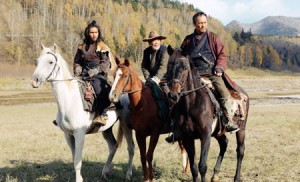JQ Magazine: Film Review – JAPAN CUTS 2014 at Japan Society

Ken Watanabe (right), stars in Unforgiven, premiering July 15 at Japan Society in New York as part of their annual JAPAN CUTS film festival. (© 2013 Warner Entertainment Japan Inc.)
By Lyle Sylvander (Yokohama-shi, 2001-02) for JQ magazine. Lyle has completed a master’s program at the School of International and Public Affairs at Columbia University and has been writing for the JET Alumni Association of New York since 2004. He is also the goalkeeper for FC Japan, a New York City-based soccer team.
This year’s JAPAN CUTS—North America’s biggest festival of new Japanese film—kicks off July 10-20 at New York’s Japan Society, continuing its tradition of showcasing the latest films from Japan along with some special guest stars and filmmakers. This year’s highlights include Japan’s blockbuster The Eternal Zero, The Great Passage (Japan’s submission for the Academy Award last year) and the post-3/11 documentary The Horses of Fukushima. Below are three of the 28 films in this year’s lineup that were made available to JQ at press time.
Eiji Uchida’s Greatful Dead marks the latest entry in the “dark and twisted” Japanese genre. The sordid story follows Nami (Kumi Takiuchi) as she follows “solitarians” (old and psychotic loners) around Tokyo and snaps selfies with them when they die. She enters into a morbid friendship with one particular “solitarian” (Takashi Sasano) and the rest of the film explores the darker side of humanity and mental illness in modern-day Japan. Uchida also seems to be making a statement about those most marginalized in modern Japan—the young and the elderly. Japan’s youth have a staggeringly large unemployment rate while the aging demographic makes for a perilously underfunded social security system.
Also using horror conventions for social satire is Miss Zombie, taking place in a futuristic Japan where zombies can be domesticated as servants and pets. Directed by Hiroyuki Tanaka (here using the pseudonym “Sabu”), Miss Zombie follows Shara, a mail order zombie whose owner, Dr. Teramoto, feeds her rotten vegetables in exchange for domestic labor. The film takes a darker turn as she is raped by two handymen—an event that sexually arouses Dr. Teramoto. Soon, Shara’s services are no longer limited to domestic chores. Even Dr. Teramoto’s wife finds her services useful after their son drowns. Overall, Sabu brings a fresh and interesting approach to the zombie film—a far cry from the works of George A. Romero and the countless imitators he inspired.
The samurai film (jidai-geki) has long been known as the Japanese version of the Hollywood Western. The plots of both genres often feature a loner individual, or group of compatriots united in their collective isolation, at odds with their societies. Most jidai-geki and Westernstake place in a historical time and place of relative anarchy and lawlessness, namely, the post-shogunate era and the Wild Wild West.
Prominent directors, such as John Ford and Akira Kurosawa, transcended the conventions of these popular genres and investigated larger themes such as violence, retribution, honor and dignity. Kurosawa even adapted Shakespeare’s Macbeth and King Lear for his Throne of Blood and Ran. Western filmmakers, in turn, have also found inspiration in Kurosawa’s films. Seven Samurai became John Sturges’s The Magnificent Seven and Yojimbo became Sergio Leone’s A Fistful of Dollars. Leone filtered Kurosawa’s story through his own “spaghetti Western” sensibility, directed two sequels (For a Few Dollars More and The Good, the Bad and the Ugly) and launched the film career of Clint Eastwood. Given this reciprocal relationship between the Western and samurai films, it is fitting that Japan has now remade Eastwood’s seminal “anti-Western” Unforgiven.
The film stays remarkably close to David Webb Peoples’ original script, Norimichi Kasamatsu reproduces Jack Green’s cinematography and director Lee Sang-Il mimics Eastwood’s pacing and mise-en-scène. Even the breathtaking snow-capped mountains and wind-swept fields of Hokkaido look a lot like the original’s sweeping vistas of Alberta, Canada. These similarities cast an uneasy feeling of déjà vu over the film—the Japanese cast and setting make it feel original, yet the narrative unfolds as a nearly shot-by-shot retelling of the original.
Ken Watanabe plays the Eastwood part (here named “Jubei the Killer”), who has renounced his previously violent lifestyle. Akira Emoto plays the Morgan Freeman role, who lures Jubei into avenging the disfiguring of a prostitute, and Koichi Sato plays Gene Hackman’s evil police chief. The time period is the 1880s (the same as the original), a time when samurai were left master-less after the Meiji Restoration. Like the original, this Unforgiven explores themes of violence and retribution as it climaxes into a bloodbath. What differentiates the two films is that Eastwood and his cast effectively plumbed the depths of his antiheroes’ psyches while Lee only superficially addresses these concerns.
For a complete listing of JAPAN CUTS 2014’s films, parties and special guest appearances, click here.


Comments are closed.